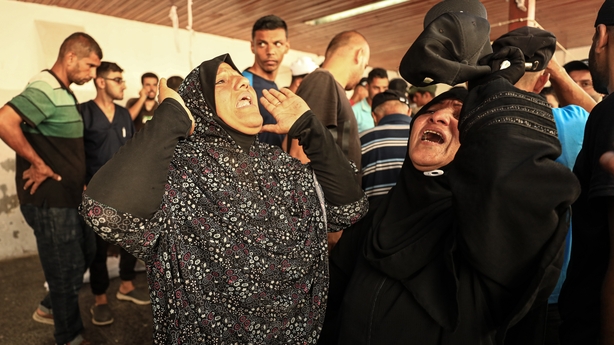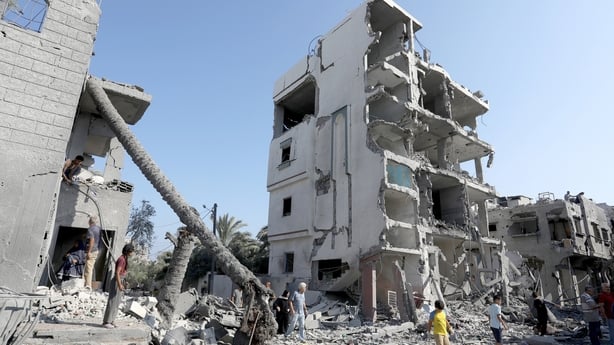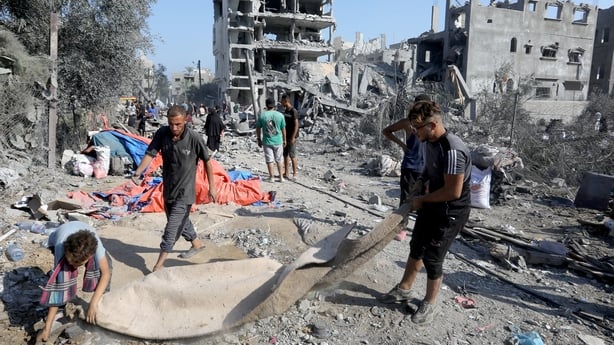Israel has vowed to "eliminate" new Hamas chief Yahya Sinwar, the alleged mastermind of the 7 October attack, whose appointment has further inflamed regional tensions as the Gaza war entered its 11th month.
The naming of Mr Sinwar to lead the Palestinian militant group came as Israel braced for potential Iranian retaliation over the killing of his predecessor Ismael Haniyeh last week in Tehran.
Speaking at a military base, Prime Minister Benjamin Netanyahu said Israel was "determined" to defend itself.
"We are prepared both defensively and offensively," he told new recruits.
Israeli Foreign Minister Israel Katz said late yesterday that Mr Sinwar's promotion was "yet another compelling reason to swiftly eliminate him and wipe this vile organisation off the face of the earth".
Yahya Sinwar, Hamas's leader in Gaza since 2017, has not been seen since the 7 October attack, which was the deadliest in Israel's history.
A senior Hamas official told AFP that the selection of Mr Sinwar sent a message that the organisation "continues its path of resistance".

Hamas's Lebanese ally Hezbollah congratulated Mr Sinwar and said the appointment affirms "the enemy... has failed to achieve its objectives" by killing Hamas leaders and officials.
Analysts believe Mr Sinwar has been both more reluctant to agree to a Gaza ceasefire and closer to Iran than Haniyeh, who lived in Qatar, was.
"If a ceasefire deal seemed unlikely upon Haniyeh's death, it is even less likely under Sinwar," according to Rita Katz, executive director of the SITE Intelligence Group.
"The group will only lean further into its hardline militant strategy of recent years," she added.
US Secretary of State Antony Blinken told reporters that it was up to Mr Sinwar to help achieve a ceasefire, saying he "has been and remains the primary decider".
Iran-backed Hezbollah has also pledged to avenge the deaths of Haniyeh and its own military commander Fuad Shukr in an Israeli strike in Beirut hours earlier.
In a televised address to mark one week since Shukr's death, Hezbollah leader Hassan Nasrallah said his group would retaliate "alone or in the context of a unified response from all the axis" of Iran-backed groups in the region.

The United States, which has sent extra warships and jets to the region, urged both Iran and Israel to avoid an escalation.
President Joe Biden had calls with Jordan's King Abdullah II, the Qatari emir, Sheikh Tamim bin Hamad Al Thani, and Egyptian President Abdel Fattah al-Sisi yesterday.
"No one should escalate this conflict. We've been engaged in intense diplomacy with allies and partners, communicating that message directly to Iran. We communicated that message directly to Israel," Mr Blinken told reporters.
Iranian President Masoud Pezeshkian told his French counterpart Emmanuel Macron in a telephone call that the West "should immediately stop selling arms and supporting" Israel if it wants to prevent war, his office said.
The Saudi-based Organisation of Islamic Cooperation has met to discuss the situation in the Middle East.
Gambian Foreign Minister Mamadou Tangara, whose country currently chairs the bloc, said the "heinous" killing of Haniyeh risked "leading to a wider conflict that could involve the entire region".
Israel has not commented on Haniyeh's killing but confirmed it had carried out the strike on Shukr.
It held the Hezbollah commander responsible for a rocket attack in the Israeli-annexed Golan Heights that killed 12 children.
Hezbollah has traded near-daily cross-border fire with Israeli troops throughout the Gaza war.
The group said that six of its fighters were killed in Israeli strikes on south Lebanon and that it had launched "dozens of Katyusha rockets" at a military base in the Golan Heights in retaliation.
Numerous airlines have suspended flights to Lebanon or limited them to daylight hours.
Israel said that its air force had "struck dozens of terror targets throughout the Gaza Strip" over the past day.
Israeli army issues new evacuation orders in north Gaza
Israeli forces have issued new evacuation orders to Palestinians in areas of north Gaza that were among the first to be hit at the start of the war with Hamas in October, after militants fired a fresh volley of rockets into Israel.
Army spokesperson Avichay Adraee posted the evacuation orders for several districts in Beit Hanoun and Beit Lahiya, two now largely demolished towns into which Israeli tanks swept at the outset of Israel's ground invasion.
"Hamas and terrorist organisations are firing rockets from your area towards the State of Israel. The IDF will act forcefully and immediately against them," Mr Adraee said in the message sent by text or social media to Palestinian residents.
"For your own safety, evacuate immediately to the known shelters in the center of Gaza City," the army spokesman said.
In a nearby Gaza City neighbourhood, Al-Tuffah, an Israeli airstrike on a house killed three Palestinians, medics said.
Fighting has continued in Gaza even as Israel braces for an expected assault in its north from Iran and its close Lebanese ally Hezbollah after the assassination of Haniyeh in Iran

The Israeli military says it has killed dozens of Gaza militants in recent days and said today that troops had hit weapons-making facilities in the teeming district of Deiral-Balah in central Gaza, where tens of thousands of Palestinians displaced by the fighting have taken shelter.
In other central areas, Israeli tanks shelled Nuseirat and Bureij, two of Gaza's eight historic refugee camps.
Israel says Hamas militants use civilian infrastructure for cover and to conceal operations posts and arms caches; Hamas denies this.
Militants say they continue to carry out ambush attacks on Israeli troops and armoured vehicles with explosive devices, and are still able to launch limited rocket salvoes into Israel.
Yesterday, Islamic Jihad, a close Hamas ally, said it fired rockets into Israel in response to what it called Israeli "massacres of civilians".
The Israeli military said that over the past week Hamas had fired rockets from launchers embedded near two international humanitarian aid and distribution warehouses, including the UN Palestinian refugee agency UNRWA. Israeli forces had struck those sites, it added.
Hamas-led militants set off the Gaza war on 7 October with across-border rampage into Israeli communities, killing 1,200 Israelis and foreigners and seizing some 250 hostages, according to Israeli tallies.
In response, Israel has pursued a relentless assault on Gaza that has reduced much of the heavily populated coastal strip to ruins, killed at least 39,600 Palestinians and wounded over 91,500, according to Gaza health ministry figures.
The Hamas-led ministry does not distinguish between combatants and civilians in its death lists.

